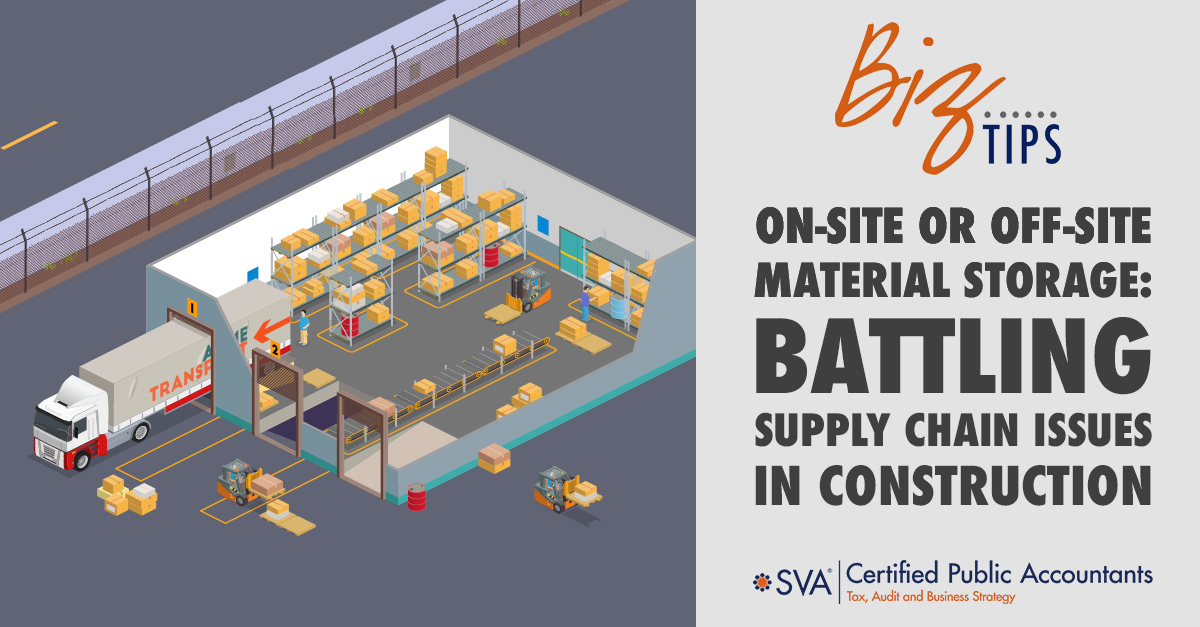| Highlights: |
- Examines how construction companies can manage supply chain challenges by choosing on-site or off-site storage for materials amid delays and shortages.
- Compares pros, cons, and cost factors of storing materials at the job site versus rented off-site space, including security and delivery implications.
- Discusses accounting and tax considerations tied to material classification and storage decisions to support better planning and risk management.
|
If you look at any industry today, you will find that supply chain issues are near the top of their list of problems. The two main problems are the inability to get needed materials and the sharp increase in prices due to demand.
The construction industry has been hit hard dealing with these issues. Many contractors want to buy their materials up front and/or in bulk to hopefully alleviate the problem of not having the materials they want when they need them.
This Biz Tip will discuss some questions that must be considered if a contractor is looking to stock up on materials prior to a project.
Where Will the Materials Be Stored? On-Site vs. Off-Site
Getting the materials you need is half the battle. Once you get them, where will they be stored? Let’s look at two scenarios for where to store materials and what questions arise from each:
On the Job Site:
Storing materials on the job site seems the most logical. The materials are close at hand for when you need them, and this will help optimize the building process. No contractor wants to wait for materials to be shipped in from an off-site location, with employees idle while waiting for deliveries to arrive.
If storing the materials on-site, do you have adequate security and insurance policies in place to reduce the risk of theft? Stockpiles of materials sitting at job sites may be tempting targets for thieves, especially if materials are hard to come by.
Insurance
Many insurance companies offer additional coverage for materials stored on the job site. There is still some risk on the materials, however theft, fire, and other unnatural property damages are covered. Situations where the materials would not be covered include neglect, errors in workmanship, or other damages caused by the insured.
Check with your insurance carrier to see if your policy already includes this coverage or if you need to make an update to your existing policy.
Off-Site Storage:
If you don’t feel secure in keeping your materials at your job site, another option is to rent storage space off-site. One drawback is that you will have to keep delivering materials to the job site from storage, which can slow the building process.
The benefit of storing materials off-site is security, which should be the responsibility of the storage company. The drawback, of course, is the cost of renting the storage space. Additional insurance coverage for the materials stored at this location and materials in transit may be needed as well.
Comparing Costs Between On-Site and Off-Site Material Storage
If you are planning to purchase your building materials ahead of time, you need to compare the costs between storing your materials on the job site or at an off-site location.
Costs to Consider:
| On-Site |
Increased costs in security at the job site, additions to current insurance policies. |
| Off-Site |
Rental payments and cost to bring goods to the job site from storage. |
How Much Material Are You Buying?
Another item to consider is the amount of materials you buy. Are you purchasing more than what is needed for a specific job(s) you have contracted? If so, you may then need to look at how these items are classified. Are these materials cost for a job(s) or are these considered inventories?
There are both accounting and tax considerations that must be considered depending on how the materials are classified. For example, if you have a significant amount of uninstalled materials, these should be excluded from the measurement of progress towards completion used to determine revenue.
Questions to Answer
The questions above need to be considered when determining where to store up-front building materials. Take the time to calculate the costs and use this information to help you make the best decision for your company.

© 2021 SVA Certified Public Accountants

